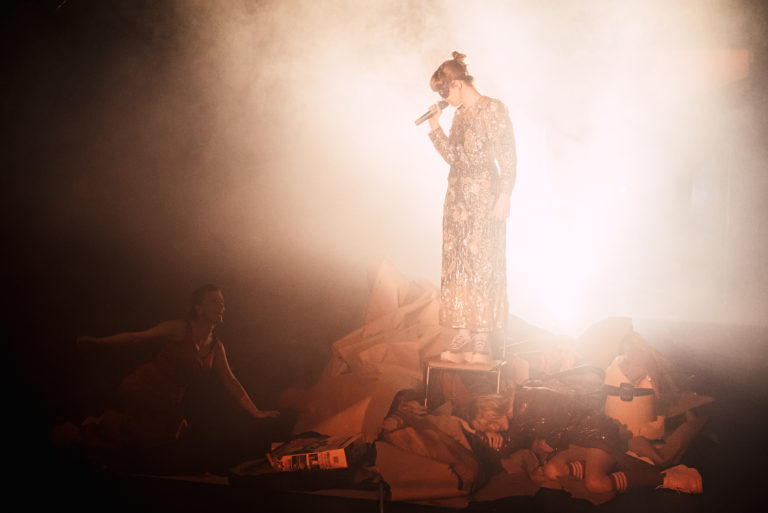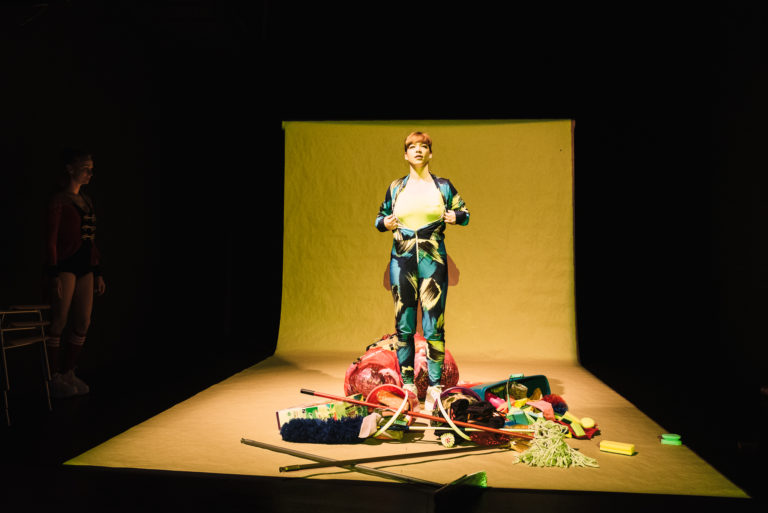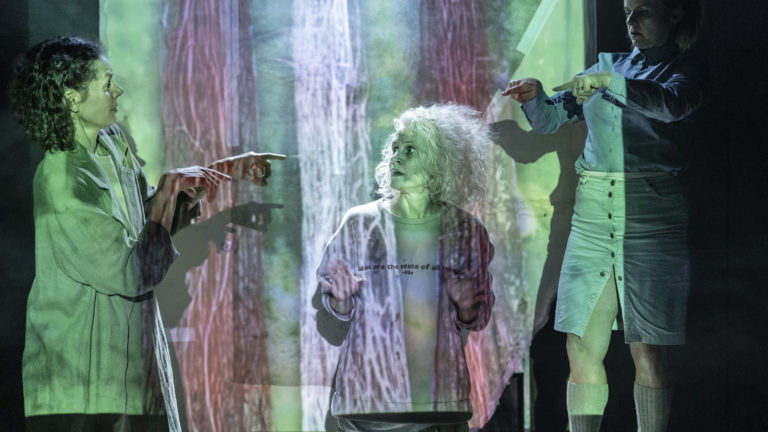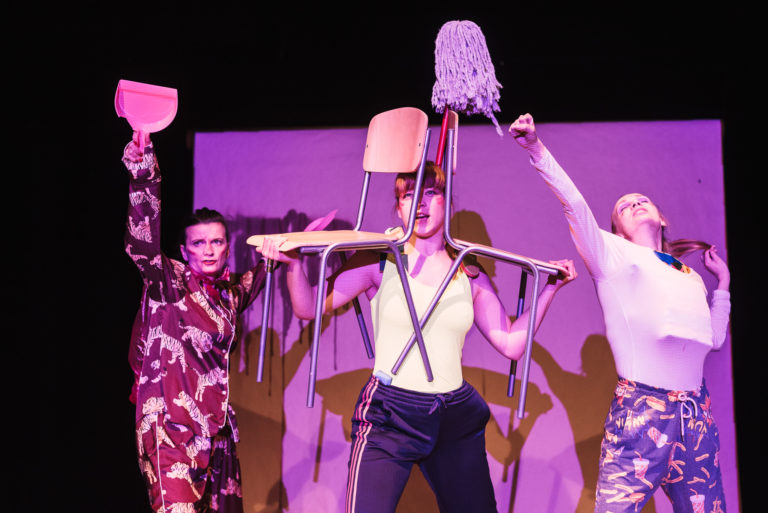Part. 1 of the series: Daydream
Author: Andrijana Trpković
This article juxtaposes the creative aspirations of the collective against an increasingly commercialised arts ecosystem. The metaphor of "Theatre vs. Supermarket" underscores the tension between authentic artistic creation and market-driven pressures that can commoditise culture akin to mass-produced goods. Drawing insights from the Towards Stronger Peripheries conference held in Belgrade, the paper highlights the urgent challenges these groups face, including financial instability, limited access to resources, and the broader socio-economic precariousness confronting the arts sector.

Cleaning Rules Performance – © Marcel Skyba
Theatre vs. Supermarket
2020 - the suspension of cultural events worldwide profoundly impacted the performing arts, triggering a paradigm shift toward digital and hybrid theatre-making due to the volatile economic environment. Pandemic crisis has resulted in significant challenges, such as a lack of touring content, workforce shortages, and rising operating costs, hindering the recovery of independent organisations and individuals.
2025 - everything around us feels 'penetrated,' used, abused, and worn out, creators and regular people alike are starting to ask themselves how to make sense of the world–and of art. Life and work become uncomfortable. At the same time, as the Dutch author and philosopher Thijs Lijster critically describes in his publication The Future of the New: Artistic Innovation in Times of Social Acceleration, if one wants to sell something, one has to emphasise its novelty. As Lijster puts it, this is at least what we are made to believe–this dominant ideology of our times: constant production and chasing originality. These short-term, ephemeral explosions, however, are destined to be short-lived, engendering a culture of capitalism that pervades all aspects of society, as Adorno asserts, resulting in a state of "sameness,” leaving scant space for spontaneity, creativity, and autonomy in artistic expression–almost identical as in the supermarket.

Cleaning Rules Performance – © Marcel Skyba
Spring 2024, Serbia: 'Right to Equality as Right to Difference'
The international conference entitled Towards Stronger Peripheries: New Coalitions and Policies of Solidarity funded by the Creative Europe programme and held in Belgrade in May 2024, was part of the Stronger Peripheries: A Southern Coalition project. The financial support for my attendance at the conference was provided by ATI (IDU) – Arts and Theatre Institute in Prague, through a "Short-term mobility support programme for professional artists and art workers",[1] otherwise, as a part of the independent theatre scene I wouldn't be able to attend it.
As Dr. Milena Dragičević Šešić, a Serbian academic and the founder of the UNESCO Chair on Interculturalism, Art Management, and Mediation articulated in her introductory address at the Belgrade Conference, the future trajectory of the performing arts must encompass advocacy for creators, collaboration, and co-productions characterised by stringent ethical standards in community relations. This underscores the necessity for international interconnectedness, exchange, and education in contemporary society. The project's primary objectives were the creation of artistic productions, the peer-training of cultural workers, and the proposal of new cultural policies that promote participative practices. Among many theorists and independent players present and presenting were Nora Juhasz, (2060) a Hungarian emerging artist (her work incorporates painting, installation, stage design, and performance, often using role-play and irony to explore social issues and critique societal norms). Nora's speech at the conference was highly evocative, describing not only the political and social state of contemporary Hungary, but also the impossibility to create freely, as a result of which she now devotes herself to projects in other fields, namely the social sector and youth work. An artistic organisation 21:21 (Safe Chemistry) based in Croatia, founded by Petra Hrascanec and Ksenija Zec, which investigates the boundaries between dance and performance using multidisciplinary collaborations and creating new performative technologies. They are also known for their involvement in the MONOPLAY contemporary dance festival in Zadar, which was, as they mentioned, keeping them alive, but simultaneously taking a lot of energy to keep the festival alive. I remember Petra's words clearly, as she mentioned: “What is privileged about the artist? When I hear someone calling me “privileged”, I only mention that I know nothing but hard work and dance–studio since I was 5 years old.”
The conference highlighted the precarious nature of artistic careers in peripheral regions, underlining the necessity for alternative models of collaboration, such as the innovative tandem model. Unlike hierarchical models, the tandem model makes sure that all parts of the team have equal stake and participation in the creative process–decisions are made collaboratively, ensuring that all partners contribute equally to the artistic direction, financial and production aspects of the work to ensure not only to survive but also thrive.
The project Strong Peripheries is developed under six topics that reflect social and political challenges common to the Peripheral South and South-eastern part of Europe. Those are: 1) Achieving work and a good quality of life, 2) Strengthening connections and expanding networks, 3) Securing daily bread (financial stability), 4) Giving artists a voice in shaping cultural policies, 5) Fostering meaningful and impactful creative work, and 6) Supporting the flourishing of independent performing arts in Europe–"right to the future".

Endemité – © Patrik Borecký
Winter 2025, Czechia: Collective Force for Social Engagement
Recently, freelance organisations and individual artists in the Czech Republic have been slowly raising concerns about their standard of living, and with parliamentary elections scheduled for autumn 2025, concerns about the influence of populists and far-right parties are heightened. Similar developments have taken place in Slovakia, where many artists have found themselves in a vulnerable position under the new Minister of Culture, multiple artists and organisations now forming a collective through the OK! Platform, and indistinguishable situations have existed in Hungary for some time. The situation is much the same in different regions and is spreading like a new pandemic.
However, as Belgian festival curator and theatre director Annemie Vanackere noted in September, following the significant reduction in cultural funding in Germany, preserving financial resources while diminishing the independent scene "can impose a significant cost on society". This, as previously outlined, signifies that danger of adopting a passive stance, can jeopardise the future, potentially resulting in diminished resilience, artistic freedom and authenticity, as well as democracy, diversity, and the economy itself. Luckily, this situation changes, not just in Czechia, but all over Europe, where the voices are being increased bringing movement to the scene.
Kolonie, an independent theatre group from Prague, that has earned a reputation for its innovative approach to theatre, seamlessly integrating physical performance with elements of music and visual arts, and its director and dramaturge Lucie Ferenzová tells me more in relation to the current state of the Czech cultural sector. Kolonie's work is characterised by a commitment to contemporary drama, with a focus on new translations and original Czech texts that are dealing with socio-political pressing issues.
Founded in 2012 by a group of women wanting to address overlooked issues, Kolonie began with minimal funding but high passion. Today, it is a respected theatre group, yet financial sustainability remains a challenge. Despite critical acclaim, the Ministry of Culture funding is often insufficient, requiring members to balance additional jobs. While collaborations, such as with a small chamber theatre A Studio Rubin (funded by the city of Prague), provide a stable backdrop for productions, financial pressures persist. Grants cover only a fraction of costs, and the team must juggle theatre work with other income sources to survive. The demanding cycle of grant applications and preparations often leaves little time for personal life. The pressure of maintaining production quality is significant, impacting family time and personal well-being. Despite this, the love for theatre continues to drive the group forward.
Ferenzová also expresses concern over the times ahead–political shifts affecting the arts, akin to challenges seen in Hungary and Slovakia. While the group operates on the margins, resilient against some external threats, the long-term impact remains worrisome and may lead to the company’s disappearance. Despite the hardships, Kolonie continues to address ongoing societal issues, in recent works such as Cleaning Rules, highlighting not just domestic but artistic precariousness, or Endemité - tales of disappearance, pointing out to the environmental crisis. Furthermore, I asked Lucie, how important it is for her to use the performance as a manifestation tool:
“That is certainly the way. Since the beginning of the Kolonie, we have always done it. But if the work wasn't precarious, if it nourished us, if we had enough time for family, rest, study, and preparation for the next project, I dare say we wouldn't create differently. We would simply be less tired, less depressed, healthier, and happier. But that's just a daydream. Sadly. And one more thought about the future: if we imagine it under the strong influence of climate change, related social changes in the sense of possible radicalisations, in short, if we don't see the future very brightly, at least we have gathered quite good adaptation skills from our theatre environment. Theatre has a future. Maybe it's all we'll have left, at the end. We'll perform it by the fire, somewhere in between the struggle to survive. With insight and humour–as we always have.”

Cleaning Rules Performance – © Marcel Skyba
The uncertainty of life in the independent theatre scene, where financial instability tends to leave artists exhausted and stressed, is affecting their wellbeing and creative output. Despite this, an unrelenting passion drives cultural workers to adapt and persevere in the face of social and environmental challenges. Ethical considerations highlight the need for a sustainable balance that gives artists enough time for personal growth and creativity while not compromising their mental and physical health. As we face an uncertain future marked by social and climate change, art, especially freely expressed, remains an essential means of declaration, resilience, and connection. Ultimately, this underscores the importance of preserving the arts and qualities of an independent scene as an essential perspective in challenging times, a permanent refuge where humanity's stories can continue to be told.
References
[1] Go and See, Arts and Theatre Institute Prague
Published on May 6th, 2025
About the author:
Andrijana Trpković is a theorist, writer, and costume and stage designer originally from Belgrade, Serbia. For over ten years, she has worked across Czech and German-speaking theatre and film, developing her artistic and scientific research based at the Philosophical Faculty of Charles University in Prague. Her methodology tightly bounds and combines theory and practice.